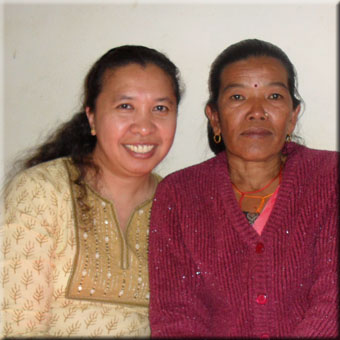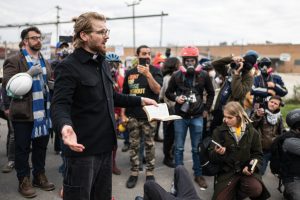Already graduated college? You can still return to school for a master's or Ph.D. in peace.
While most peace studies programs are at the undergraduate level, at least 76 schools worldwide offer graduate programs. Among Catholic schools in the United States alone, there's amazing variety, including Duquesne University's graduate certificate in conflict resolution and peace studies; Georgetown University's master of arts in conflict resolution; Catholic Theological Union's M.A. in justice ministry; and the University of Notre Dame's Ph.D. in peace studies. These programs often draw students who already have considerable peacebuilding experience.
Christopher Yanov received his master's degree in peace and justice studies from the University of San Diego in 2003. In 2001, after several years of doing youth ministry and outreach to gang members, Yanov started Reality Changers, a San Diego nonprofit that provides academic support, scholarships, and faith-based leadership training to disadvantaged inner-city youth to help them reach college.
 He enrolled at USD's Kroc School of Peace Studies (KSPS) shortly after because he wanted to learn practical skills for conflict resolution. Instead, he found the program much more theory-based.
He enrolled at USD's Kroc School of Peace Studies (KSPS) shortly after because he wanted to learn practical skills for conflict resolution. Instead, he found the program much more theory-based.
That doesn't surprise Holy Ghost Father William Headley, dean of KSPS. "If there's a common thread among our students, it's that they largely see peace and justice studies as an applied discipline," he says. "These are people who want to put what they learn to work."
Today Yanov is still with Reality Changers, which has expanded rapidly and has raised more than $4.2 million in scholarships for the program's graduates. He also has a greater appreciation for what he learned at KSPS: "When people see what a successful program [Reality Changers] is, they often ask about the philosophy and theory behind it."
Yanov's class of 13 at KSPS included students from Afghanistan, Rwanda, Uganda, and Eritrea, and others with strong international ties. The global perspectives of his classmates complemented his coursework, and the bonds they formed in and out of classes remain strong. "We still trade off e-mails all the time," Yanov says.
The international aspect has been likewise valuable to Shamsia Ramadhan, a master's student at Notre Dame's Kroc Institute for International Peace Studies. (The late philanthropist Joan B. Kroc, wife of McDonald's CEO Ray Kroc, funded the peace studies programs at both schools).
 "You get to engage people outside of class on what challenges they've faced and how they've been able to address them," says Ramadhan, a Muslim from Kenya who has worked with Chemchemi Ya Ukweli ("Wellspring of Truth" in Swahili), an interfaith organization in her home country that promotes peace through active nonviolence and dialogue.
"You get to engage people outside of class on what challenges they've faced and how they've been able to address them," says Ramadhan, a Muslim from Kenya who has worked with Chemchemi Ya Ukweli ("Wellspring of Truth" in Swahili), an interfaith organization in her home country that promotes peace through active nonviolence and dialogue.
Ramadhan doesn't have to go far to compare notes with someone: Her roommate, Myla Leguro, worked for Catholic Relief Services in the Philippines for 12 years on peacebuilding initiatives between Christians, Muslims, and the indigenous population in her native western Mindanao before coming to Notre Dame.
Leguro expects to continue her work with CRS and the Mindanao Peacebuilding Institute after graduation, but she opted for graduate study in order to gain a wider perspective on the practice of peacebuilding and to get more grounded in her own Catholic tradition so as to better engage people of other beliefs.
Perhaps surprisingly, Ramadhan has also been able to grow in her faith during grad school. She recently had a chance to meet with Father Theodore Hesburgh, president emeritus of the university and founder of the Kroc Institute. He told Ramadhan he hoped that her experience at Notre Dame was helping her to strengthen her faith and become a better Muslim-a message she's also received from faculty, staff, and fellow students at the Kroc Institute.
It's a message this peace studies student takes in stride. "People of all religions have something in common: the desire for the well-being of communities," she says.













Add comment